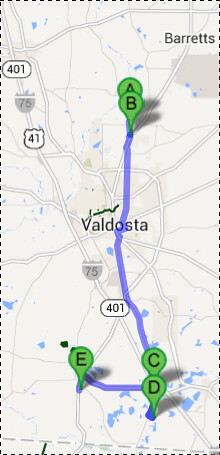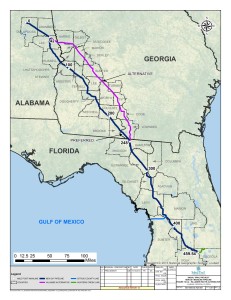 Yesterday
Nova Scotia announced a ban on fracking.
Will local or state governments in the southeast, now threatened
by the Sabal Trail fracked methane pipeline,
ban such pipelines?
Especially since FERC has now directed Sabal Trail to examine
routes through Americus, Cordele, Ashburn, Tifton, Adel, Valdosta, and even Thomasville,
in addition
to the ones it already proposed through Dougherty, Colquitt, Brooks, and Lowndes Counties?
Yesterday
Nova Scotia announced a ban on fracking.
Will local or state governments in the southeast, now threatened
by the Sabal Trail fracked methane pipeline,
ban such pipelines?
Especially since FERC has now directed Sabal Trail to examine
routes through Americus, Cordele, Ashburn, Tifton, Adel, Valdosta, and even Thomasville,
in addition
to the ones it already proposed through Dougherty, Colquitt, Brooks, and Lowndes Counties?
Sierra Club Canada wrote about public meetings in its Media Release of 28 August 2014, Government of Nova Scotia Needs to Ban Fracking,
“Public meetings held by the panel were attended by an overwhelming majority of well-informed citizens who had deep concerns about fracking,” according to [Gretchen] Fitzgerald, “Those concerns should be met with the type of leadership they deserve: an immediate, legally binding ban.”
And the Nova Scotia government listened. Bruce Erskine wrote for The Herald Business 3 September 2014, Nova Scotia to ban fracking, posting a video in which you can hear Energy Minister Andrew Younger say:
“Nova Scotians have indicated that by a wide margin they are concerned about hydraulic fracturing and they do not want it as part of onshore development of shales in Nova Scotia at this time,
“Nova Scotians have put their trust in our government, that we will listen to the concerns and not allow a process that most Nova Scotians are just simply not comfortable with at this time.”
 We’ve seen the same thing in the Sabal Trail Open Houses
and
the FERC Scoping Meetings for the Sabal Trail pipeline:
overwhelming public opposition to the pipeline.
With FERC representatives standing right there.
We’ve seen the same thing in the Sabal Trail Open Houses
and
the FERC Scoping Meetings for the Sabal Trail pipeline:
overwhelming public opposition to the pipeline.
With FERC representatives standing right there.
A few local governments have started to listen:
- 3 March 2014: Valdosta City Council Tim Carroll filed a letter with FERC opposing the pipeline. But the Valdosta City Council has not, nor passed any resolution or ordinance.
- 4 March 2014: Dougherty County attorney and a commissioner spoke against the Sabal Trail pipeline, but as near as I can tell have passed no resoultion or ordinance.
- 4 March 2014: Colquitt County, GA Commission Resolution 2014-R-6 asking for minimum 5 foot top cover, but not an ordinance.
- 26 March 2014: Gilchrist County, FL Commission filed lengthy comments with FERC, but no resolution or ordinance.
- 7 April 2014: Brooks County, GA Commission passed the same resolution as Colquitt County, but no ordinance.
- 11 April 2014: Lowndes County, GA Chairman sent a letter to FERC with 14 points of existing ordinances and permits Sabal Trail would be expected to follow, but the Lowndes County Commission didn’t even pass a resolution, much less an ordinance.
- 22 August 2014: Hamilton County, FL Commission in Florida passed a resolution asking Sabal Trail to move the pipeline off the Withlacoochee River and otherwise to avoid the fragile karst limestone that encloses our drinking water in the Floridan Aquifer. But not an ordinance.
Opposition in Hamilton County has already had some effect. On 27 August 2014 FERC directed Sabal Trail (among many other things) to look at routes that did not cross the Withlacoochee River in Hamilton County. On 30 August 2014 Sabal Trail said it was considering moving off the Withlacoochee River.
 Yet resolutions and letters don’t have the force of law.
Land-use ordinances do,
such as the one
Jefferson County, Florida ordinance 2011-072111-02 of 6 October 2011
to prohibit extraction of local water for bottling.
Yet resolutions and letters don’t have the force of law.
Land-use ordinances do,
such as the one
Jefferson County, Florida ordinance 2011-072111-02 of 6 October 2011
to prohibit extraction of local water for bottling.
A citizen of Suwannee County has written a letter to county commissions recommending that Jefferson County ordinance as one of several precedents, including resolutions passed by counties in Virginia against another Spectra pipeline that were at least stronger than the Georgia county ones, and that were followed in less than a month by Spectra “suspending” that Virginia pipeline.
The letter is co-signed by many organizations, including the Suwannee Alliance For Sustainable Growth, Our Santa Fe River, SpectraBusters, Inc., and WWALS Watershed Coalition, Inc.. Our Santa Fe River and WWALS are both of the currently-active watershed conservation nonprofits representing rivers in the Suwannee River Basin. WWALS, which has posted its own message of support for local legislation, represents the Withlacoochee River, which the Sabal Trail pipeline still plans to cross at the Brooks-Lowndes County border just south of US 84.
Although one of the directions FERC just gave Sabal Trail was to look at:

- Alternative 1 extending from near MP 0 to MP 460.6 (the proposed endpoint) following the Sabal Trail Transmission, LLC (Sabal Trail) proposed Sabal Trail Project (Project) route until reaching Highway 82 near Dawson, Georgia; then following Highway 82 to Interstate 75 (I-75); then following I-75 to Highway 91 near The Villages, Florida; then following Highway 91 to Highway 27 near Ferndale, Florida; and then following a Florida Gas Transmission (FGT) pipeline to the proposed endpoint.
Translation: Alternative 1 runs right through Tifton, Adel, Hahira, and Valdosta down I-75 and on through Florida past sinkhole-prone The Villages. There’s a FERC-required Alternative 2 that does the same thing. And an Alternative 4 that bashes through Americus, Cordele, Ashburn, and CHula before hitting Tifton, Adel, Hahira, and Valdosta. And an Alternative 3 that goes therough Camilla, Thomasville, and Monticello, FL to Capps, FL, before turning east along the existing Florida Gas Transmission (FGT) route.
The only Sabal Trail route that does not pass through Lowndes County is that Alternative 4. Which makes Lowndes County a key to stopping the pipeline.
What will the Lowndes County Commission do? And the County Commissions of Cook, Tift, Turner, Crisp, Sumter, and Thomas Counties in Georgia, and Jefferson County, FL? And the city councils of Valdosta, Hahira, Adel, Tifton, Ashburn, Cordele, Americus, and Thomasville? Whom do you serve? We hope it’s your local citizens.
And what about the legislatures of Florida, Georgia, and Alabama?
-jsq
Short Link: